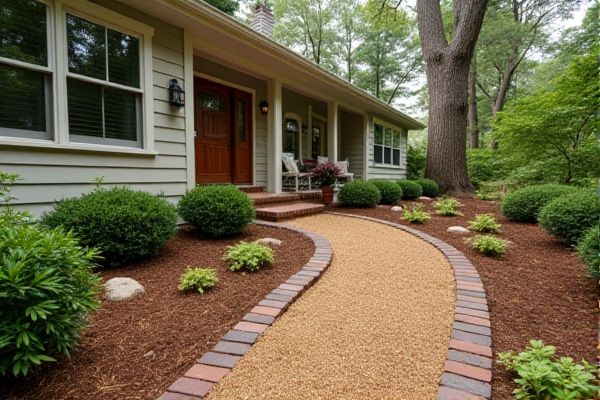
Cedar mulch resists decay and repels insects due to its natural oils, making it ideal for long-lasting landscaping, while cypress mulch offers excellent moisture retention and a slower breakdown rate, enhancing soil health over time. Discover which option best suits your garden's needs and how to maximize its benefits by reading the full article.
Table of Comparison
| Feature | Cedar Mulch | Cypress Mulch |
|---|---|---|
| Source | Cedar trees (Western Red Cedar, Eastern Red Cedar) | Cypress trees (Bald Cypress, Pond Cypress) |
| Color | Reddish-brown, natural wood tone | Light brown to tan, natural earthy shade |
| Longevity | 6 to 12 months | 8 to 12 months |
| Decay Rate | Slow, resistant to rot due to natural oils | Moderate, contains natural oils but less resistant than cedar |
| Insect Repellent | Natural insect-repellent properties | Some insect resistance, less than cedar |
| pH Level | Neutral to slightly acidic (around 5.5 to 6.5) | Neutral to slightly acidic (around 6.0 to 6.8) |
| Texture | Coarse and fibrous | Fine to medium, softer texture |
| Environmental Impact | Sustainably harvested options available; potential allelopathic effects | Often harvested from wetlands; sustainability varies by source |
| Cost | Moderate to high, depending on region | Moderate, generally less expensive than cedar |
| Best Uses | Flower beds, garden paths, insect resistance needed | Landscaping, erosion control, moisture retention |
Introduction to Cedar and Cypress Mulch
Cedar mulch, derived from Western Red Cedar or Eastern White Cedar trees, offers natural insect-repellent properties and a pleasant aromatic scent that benefits garden plants. Cypress mulch, sourced from cypress trees commonly found in the southeastern United States, is prized for its durability and resistance to decay, providing long-lasting ground cover. Both mulches enhance soil moisture retention and temperature regulation, but cedar mulch tends to break down faster than cypress mulch, influencing mulch choice based on garden needs.
Key Differences Between Cedar and Cypress Mulch
Cedar mulch is known for its natural insect-repellent properties and strong aroma, which helps deter pests and inhibit fungal growth, making it ideal for gardens requiring pest control. Cypress mulch tends to be more durable and resistant to decay due to its dense wood fibers, providing longer-lasting ground coverage and moisture retention for plants. Both mulches improve soil health and suppress weeds, but choosing between cedar's aromatic benefits and cypress's longevity depends on specific landscaping needs.
Benefits of Using Cedar Mulch
Cedar mulch offers natural insect-repelling properties, helping protect your plants from pests without harmful chemicals. It also decomposes slowly, maintaining soil moisture and reducing the frequency of reapplication. Its pleasant aroma and rich reddish color enhance the aesthetic appeal of garden beds while supporting healthy soil structure.
Benefits of Using Cypress Mulch
Cypress mulch offers excellent moisture retention and natural resistance to decay, making it a durable choice for landscaping. Its ability to repel insects and resist fungal growth helps protect your plants and improve soil health. Using cypress mulch enhances your garden's aesthetic with its rich color and fine texture while promoting sustainable practices due to its slow decomposition rate.
Environmental Impact: Cedar vs Cypress Mulch
Cedar mulch is often favored for its natural pest-repellent properties and slower decomposition rate, which reduces the frequency of replenishment and limits environmental disturbance. Cypress mulch, while biodegradable and enriching soil quality over time, faces sustainability concerns due to declining cypress tree populations and potential habitat disruption. Choosing cedar mulch supports more sustainable forestry practices, whereas cypress mulch may contribute to ecological imbalance if sourced irresponsibly.
Durability and Longevity Comparison
Cedar mulch offers superior durability due to its natural oils that resist decay, typically lasting 1-2 years longer than cypress mulch. Cypress mulch decomposes faster under moist conditions, requiring more frequent replacement compared to cedar's extended longevity of up to 3 years. Both mulches provide soil moisture retention and weed control, but cedar's longer lifespan makes it a cost-effective choice for long-term landscaping projects.
Pest and Disease Resistance
Cedar mulch contains natural oils and compounds like thujone that effectively repel pests such as termites, ants, and mosquitoes, while also inhibiting fungal growth, making it highly resistant to diseases. Cypress mulch offers moderate pest resistance due to its natural insect-repellent properties, but it is more prone to faster decomposition, potentially harboring fungi and pests over time. Choosing cedar mulch can significantly reduce pest infestations and disease issues in garden beds, garden landscapes, and playground areas.
Cost Analysis: Cedar vs Cypress
Cedar mulch typically costs between $30 and $60 per cubic yard, making it moderately priced compared to other organic mulches. Cypress mulch ranges from $25 to $50 per cubic yard, often making it a more budget-friendly option for large landscaping projects. Both mulches provide long-lasting coverage, but the slightly higher price of cedar mulch reflects its natural aromatic properties and insect-repellent benefits.
Best Uses for Each Type of Mulch
Cedar mulch is excellent for repelling insects and is ideal for use around garden beds and walkways where pest control is important. Cypress mulch retains moisture effectively and helps prevent soil erosion, making it suitable for landscaping in areas with heavy rainfall or slopes. You can choose cedar mulch for ornamental plantings and cypress mulch for areas requiring superior moisture retention and soil stabilization.
Conclusion: Choosing the Right Mulch for Your Garden
Cedar mulch offers strong natural insect-repellent properties and durability, making it ideal for pest-prone gardens. Cypress mulch boasts excellent moisture retention and resistance to decomposition, benefiting plant health and soil quality. Selecting between cedar and cypress mulch ultimately depends on specific garden needs such as pest control or moisture management.
 homyna.com
homyna.com